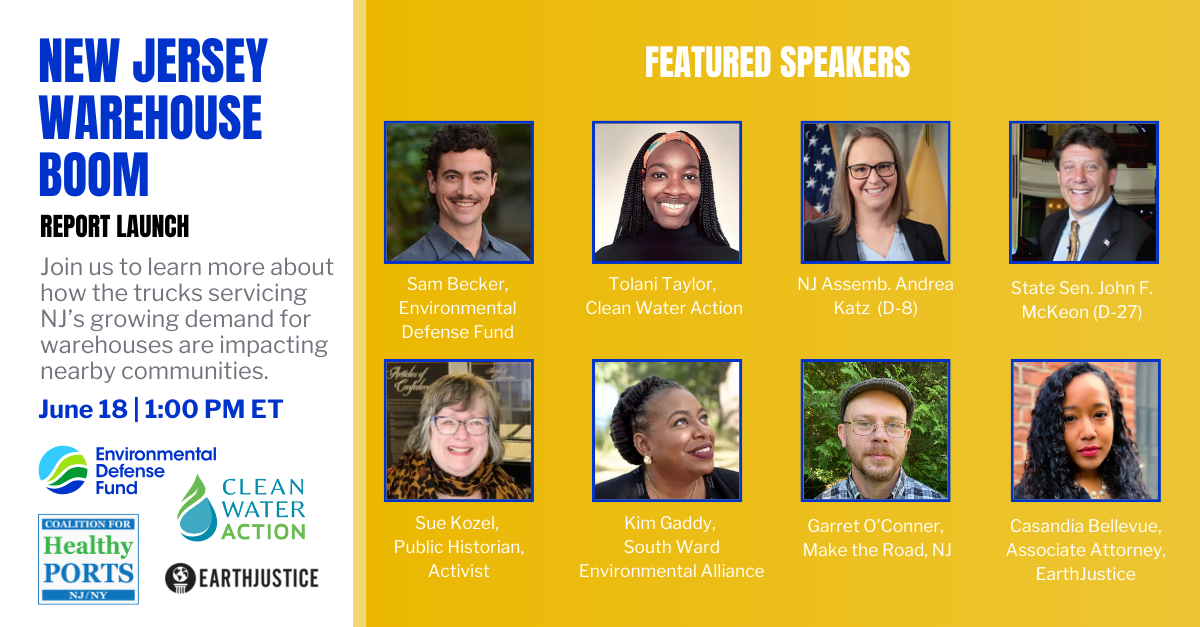
On June 18, 2024, I had the opportunity to co-host a virtual press conference with Environmental Defense Fund (EDF) where Clean Water Action co-released a NJ Warehouses Proximity Report. We showcased a series of regional maps illustrating high concentrations of warehouses throughout New Jersey and the corresponding impact these facilities pose. I did not expect the findings to so dramatically reveal that warehouses are largely located in already overburdened Black, Brown and low-income communities regardless of whether the facilities are in an urban, suburban or rural location. This pattern of development perpetuates the environmental injustices these communities face every day.

The press conference included many speakers representing different perspectives of the NJ freight and goods movement industry from labor, community, environmental justice to policy, and different regions of the state. In addition to the launching of this report, NJ State Senator McKeon (LD 27) and Assemblywoman Katz (LD 8), announced their sponsorship of the Warehouse and Port Pollution Reduction Act (S3546/A4679), which would curb pollution at warehouses, ports and other truck attracting facilities by requiring them to implement concrete emission reduction measures through an indirect source review program. The bill would direct the NJ Department of Environmental Protection (DEP) to establish flexible compliance options alongside permitting requirements to achieve these reductions, with higher thresholds for environmental justice communities.
Here are some quotes from the sponsors:
“We have seen a huge increase in warehouses across the state in the last few years and they don’t only add traffic around them — but also air pollution. I see it every day when I’m driving down [Route] 206 with my kids and I’m not the only one. We have giant trucks rumbling down residential streets that were never built with this in mind. I’m proud to be introducing legislation that will bring transparency to where these mega-warehouses are going and how they impact the community around them,” said State Assemblywoman, Andrea Katz.
“There is no doubt that warehouses and ports are a critical component of NJ’s freight and goods movement industry. But the health and environmental impact they have on many communities that live in close proximity to these facilities, cannot be tolerated any longer. Which is why I am proud to support legislation like establishing an ISR program here in NJ. This policy just goes to show that it is possible to create a freight and goods movement system that is sustainable for all stakeholders involved,” added State Senator, John F. McKeon.
For access to the report, you can check out this recent press release here. You can also listen to the recording of the press conference here.
We can’t wait to get the legislation moving when the state legislature comes back from summer break in September. In the meantime, there is something you can do today-sign and amplify our ongoing warehouse petition directed at the DEP!
Despite the significant impact of warehouses, especially in environmental justice communities, warehouses are currently not included as a specific category on the NJ DEP’s EJMAP, a tool designed to identify areas in New Jersey that may be disproportionately burdened by environmental hazards and stressors. This omission fails to adequately address the concerns of communities already struggling with multiple environmental justices.
By including warehouses on the EJ MAP, the NJ DEP can take a significant step towards making information more accessible to impacted communities by existing warehouse development in addition to holding warehouse developers accountable for the air pollution they are creating on a daily basis. Take action and sign and share our warehouse petition!
For updates on the Warehouse and Port Pollution Reduction Act, please feel free to reach out to Tolani Taylor, Clean Water Action’s Zero Emissions & Warehouse Organizer.


